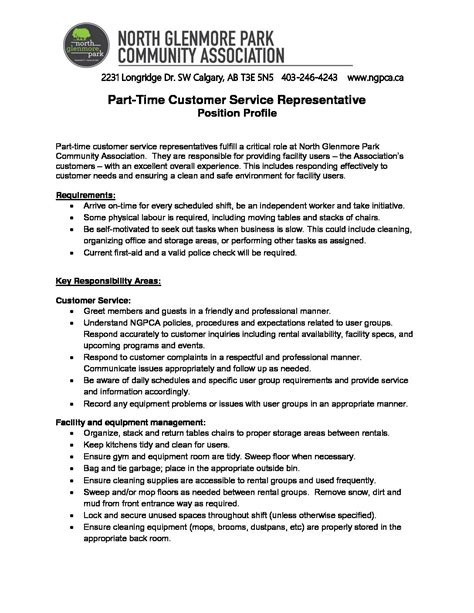The world of customer service has undergone significant transformations in recent years, driven by technological advancements, shifting consumer expectations, and the evolving nature of work itself. Among these changes, the rise of part-time customer service jobs has been particularly noteworthy, offering a flexible and often remote work arrangement that appeals to a wide range of individuals. This shift is not only a response to the changing workforce demographics but also a strategic move by companies to tap into a broader talent pool, improve customer satisfaction, and reduce operational costs. In this context, understanding the landscape of part-time customer service jobs is crucial for both employers and job seekers navigating this new terrain.
Evolution of Customer Service

The evolution of customer service from traditional brick-and-mortar setups to omnichannel experiences, encompassing social media, email, chatbots, and phone support, has created a plethora of opportunities for part-time employment. Companies are now more inclined to hire part-time customer service representatives who can work flexible hours, including evenings and weekends, to ensure 24⁄7 support. This flexibility is particularly beneficial for students, caregivers, and individuals seeking to supplement their income or transition into the workforce gradually. Moreover, the advent of remote work technologies has made it possible for customer service jobs to be performed from virtually anywhere, further increasing the potential for part-time positions.
Benefits for Employers and Employees
Part-time customer service jobs offer numerous benefits for both employers and employees. For employers, these arrangements can lead to reduced overhead costs, as they do not have to provide full-time benefits or maintain a large, permanent workforce. Additionally, part-time staff can be more easily scaled up or down according to seasonal demands or fluctuations in customer inquiries. For employees, part-time customer service jobs provide flexibility, allowing them to balance work with other responsibilities or pursue additional employment opportunities. These positions also serve as an excellent entry point for those looking to gain experience in customer service or transition into full-time roles within the company.
| Category | Benefits |
|---|---|
| Employers | Reduced overhead costs, flexibility in staffing |
| Employees | Work-life balance, opportunity for career advancement |

Key Skills and Qualifications

To succeed in part-time customer service jobs, individuals typically need to possess excellent communication skills, both written and verbal, as well as the ability to empathize with customers and resolve issues efficiently. Proficiency in relevant software and technology, such as customer relationship management (CRM) tools and helpdesk platforms, is also crucial. Given the part-time and often remote nature of these positions, self-motivation, discipline, and the ability to work independently are highly valued. Furthermore, as customer service interactions become increasingly digital, having a basic understanding of social media platforms and being adept at handling customer inquiries through various channels is becoming more important.
Technical Requirements and Training
Technical requirements for part-time customer service jobs can vary significantly depending on the company, the products or services offered, and the specific responsibilities of the role. However, most positions require a reliable computer, internet connection, and a quiet, dedicated workspace for those working from home. Employers often provide training on their specific systems, policies, and products to ensure that part-time representatives can effectively support customers. This training may include modules on communication skills, conflict resolution, and the use of customer service software. The ability to learn quickly and adapt to new technologies and processes is an essential skill for success in these roles.
Key Points
- Part-time customer service jobs offer flexibility and can be performed remotely, appealing to a wide range of candidates.
- These positions require excellent communication and problem-solving skills, as well as the ability to work independently.
- Technical proficiency, including knowledge of CRM tools and helpdesk software, is increasingly important.
- Employers benefit from reduced overhead costs and the ability to scale staff according to demand.
- Part-time customer service representatives play a critical role in shaping customer experiences and brand loyalty.
In conclusion, part-time customer service jobs represent a significant opportunity for individuals seeking flexible employment arrangements and for companies looking to enhance their customer support capabilities. As the nature of work continues to evolve, it is likely that these positions will become even more prevalent, offering a win-win scenario for both employers and employees. By understanding the benefits, requirements, and skills needed for these roles, individuals can better position themselves for success in the customer service sector, and companies can leverage part-time talent to improve customer satisfaction and loyalty.
What are the primary benefits of part-time customer service jobs for employees?
+The primary benefits include flexibility in scheduling, the opportunity to gain experience in customer service, and the potential for career advancement. These jobs also offer a chance to develop valuable skills such as communication, problem-solving, and time management.
How can employers effectively manage and support part-time customer service representatives?
+Employers can effectively manage and support part-time customer service representatives by providing comprehensive training, ensuring they have the necessary tools and technology, fostering open communication, and recognizing and rewarding their contributions to the team and customer satisfaction.
What skills are most valued in part-time customer service jobs?
+The most valued skills include excellent communication and interpersonal skills, the ability to work independently, proficiency in customer service software and technology, and strong problem-solving and conflict resolution skills. Adaptability, patience, and a customer-centric approach are also highly valued.



